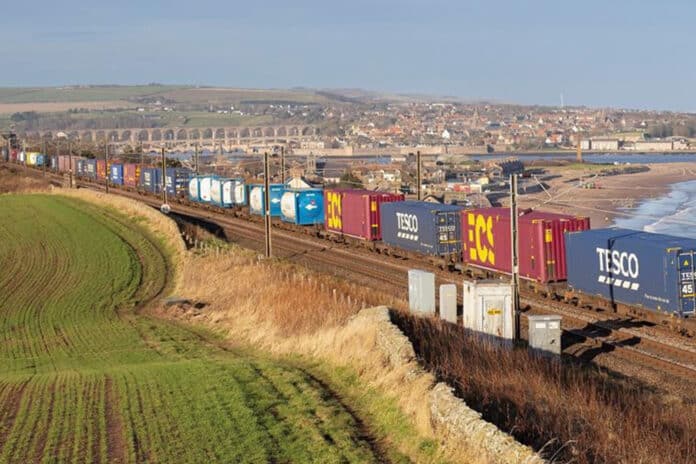Rail Partners – the trade body bringing together the five biggest freight operators who move 99% of the country’s rail freight – has launched a new report which reveals a growing rail freight market, supported by the right policies, can deliver significant economic and environmental benefits between now and 2050.
The report – Freight expectations: How rail freight can support Britain’s economy and environment – includes independent analysis by Aether, the University of Hull’s Logistics Institute and Railfreight Consulting which demonstrates rail freight’s continued environmental advantage over the road haulage sector. It also shows that, if the rail freight sector is supported by the right policy environment, it can flourish and help support a more prosperous, greener economy in the future.
When comparing road and rail flows today, Aether concluded a typical freight service produces 76% less CO2 per tonne than the equivalent movement by road. By operating longer and heavier freight services, freight operators are significantly improving productivity and growing the freight market. Analysis shows these innovative services ease road congestion by removing up to 129 HGVs from the road network per train, while further enhancing rail freight’s carbon and air quality performance.
If Government sets an ambitious target to treble rail freight by 2050, the sector will deliver nearly £5.2bn in economic benefits as a minimum. It will also support road decongestion and improved air quality, with the sector forecast to remove the need for over 20 million HGV journeys annually.
Rail Partners’ chief executive, Andy Bagnall, said: “With the right support, rail freight can deliver for Britain – boosting the economy and reducing carbon emissions as well as improving air quality and reducing congestion, especially in cities.
“We welcome recent commitments to deliver rail reform and must now focus on the detail. Setting an ambitious rail freight growth target – underpinned by legislation – is critical to capturing the benefits that a vibrant rail freight sector can offer.”
Morwen Mands, Head of Sustainability at Highland Spring Group – who feature within one of the case studies in the report and recently made an investment in a new rail connected facility – said: “Environmental sustainability has been at the heart of our business for over 40 years, and our new rail freight facility is a critical part of our commitment to tackling climate change and being a considerate neighbour to the local community.
“We believe the landmark project in Blackford is an excellent example of the power of partnership working between the rail industry, government and business which will provide wider benefits to the Scottish environment and economy. We hope this facility inspires other businesses to explore using rail freight to support their own journey to net zero.”
Realising an ambitious target to treble freight will require a largely private rail freight sector to work in partnership with government. Freight operators and their customers will need to invest in new assets and infrastructure to grow and decarbonise the freight sector. To provide freight operators with the confidence to make these investments, Rail Partners and its members have called for government to deliver the following policy framework:
- setting an ambitious growth target of trebling rail freight by 2050;
- maintaining a stable access, charging and performance regime;
- making optimal use of existing capacity on the rail network;
- targeted infrastructure investments on areas of the network with high freight growth potential;
- and an expansion of incentives to make rail the mode of choice for freight customers.
Welcoming the new analysis, DB Cargo’s CEO Andrea Rossi said it gave further weight to the company’s argument that ‘Freight Belongs on Rail.’
“We’ve spent the last two years lobbying politicians and civil servants of the significant economic and environmental benefits of rail freight over road haulage,” said Andrea.
“FreightBelongs On Rail. We know it. Our existing customers know it. The public knows it. We now need the UK Government to work with us to enable more of it to switch from road to rail.
“Setting a clear and ambitious target for rail freight growth, like already exists in Scotland, will give confidence in the sector, stimulate investment and unlock rail freight’s true potential.”
Andrea said the latest research, commissioned by Rail Partners, showed the size of the economic and environmental benefits was increasing all the time, with freight operating companies now able to run longer and heavier trains.
He said DB Cargo UK’s pioneering use of hydro-treated vegetable oil (HVO) to fuel its locomotive fleet was also helping to drive down carbon emissions even further.
“This latest research shows that a single freight train can now carry the equivalent of 129 HGVs.If you then run that train on HVO, as opposed to diesel, the reduction in carbon emissions is even greater,” added Andrea.
Photo credit: Rail Partners







































 0113 2082620
0113 2082620 info@railbusinessdaily.com
info@railbusinessdaily.com 15 Mariner Court, Wakefield WF4 3FL
15 Mariner Court, Wakefield WF4 3FL

